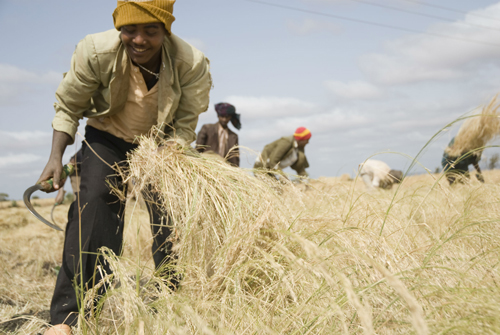By Alaa Abdelwaneis
Teff seems to be the future wheat substitute in global markets, only last week, an unexpected CNN’s Market place Africa report suggested that teff is likely to boost into international markets as a healthier, cheaper and easier-growing alternative to traditional wheat. The London based Holland & Barrette, multi-national health food shops, announced its interests in replacing wheat-originated products with teff instead. Offering a blended variety of products that could be produced from the Ethiopian grains… giving Ethiopia a chance to compete with major agriculture players of global markets…
Teff is from a family of white maize planted in the Horn of Africa, especially in Ethiopia and Eritrea. It has high health benefits since it is rich in vitamins and minerals, it is high in dietary fibers, protein, iron and calcium, and is ideal for people with diabetes. It is important for people who are looking for healthy food, because it is a full grain that has not been subjected to genetic modification.
This grain represents around a quarter of Ethiopia’s production of grains. Ethiopians have relied on it in their diet for more than 5000 years. Actually,it could be referred to as the reason that Prophet Muhammad (Peace be upon him)chose ‘Abyssinia’ or Ethiopia as thefirst Islamic migration destination.
Ethiopians use teff to bake traditional “Injera” bread as well as, produce “Tella”, a traditional beer.
It may be the cause of attracting western countries such as, Canada to Ethiopia, and the establishment of programmes such as ‘seeds of survival’. Lack of anemia in Ethiopia, despite the famine that they suffer,may be due to their consumption of teff.
Ethiopians are proud of this grain, as it is part of their historical identity and has even attracted international attention…
However, this golden grain is considerably unknown outside the African region except for some Hollywood stars who use this grain in biscuits, bread, pasta and other foods beneficial to their diet.
When asked if it was possible for Egypt to take advantage of the teff, Khalid Bomba, Chief Executive Officer of the Ethiopian Agricultural Transformation Agency (ATA) said: “I must send to Egypt a large share of this golden grain especially that Egypt is one of the largest importers of grain in the world.”
Perhaps Egypt should turn to African countries where there are many opportunities yet lack of funds -instead of directing its sights to western countries- . There should be more closer government cooperation with African countries, particularlyEthiopia, where one of the world’s most fertile lands. Egypt can increase its imports of many products from Ethiopia such as teff, coffee and meat -alive and slaughtered. While, there are many Egyptian products that could be exported to Ethiopia as a start of a fruitful cooperation.


